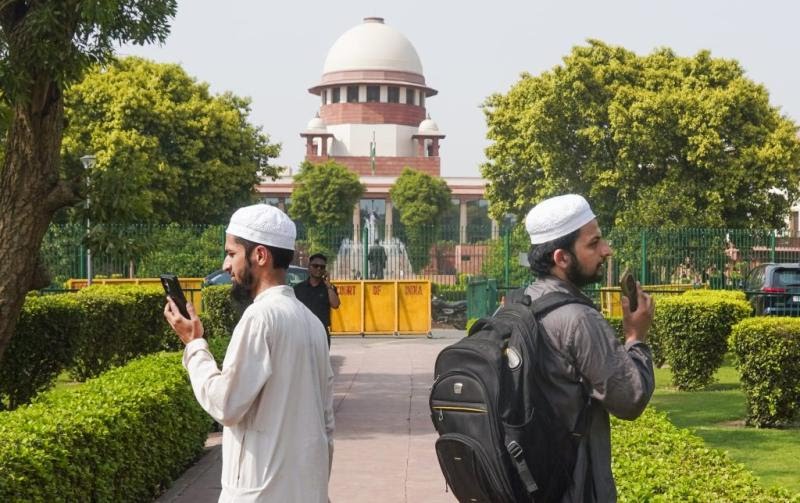Centre Defends Waqf Amendment in Supreme Court, Says Waqf ‘Not a Fundamental Right or Essential to Islam’
New Delhi: On the second day of day-long hearings on the constitutionality of the Waqf (Amendment) Act, 2025, held on Wednesday (May 21), the Union government defended the legislation, arguing that waqf is “not a fundamental right” nor an “essential” part of Islam.
The matter is being heard by a bench comprising Chief Justice B.R. Gavai and Justice Augustine George Masih.
Solicitor General Tushar Mehta, appearing for the Union government, told the court that, “Waqf by user is not a fundamental right, it was recognised by statute in 1954, and before that in Bengal Act… A judgment says that if some right is conferred by statute, as legislative policy, right can always be taken away by the State,” Mehta stated, as quoted by Bar and Bench.
Citing B.R. Ambedkar’s speech in the Constituent Assembly, Mehta further argued that waqf is not an essential part of Islam. “Waqf is an Islamic concept, no dispute, but waqf is not an essential part of Islam. Unless that aspect is shown (rest of arguments fail)… Charity is part of every religion. It is part of Christianity also, but Supreme Court says it is not an essential part… Hindus have a system of daan, Sikhs also have (charity)… but it is not an essential part.”
“Waqf is nothing but just charity in Islam,” he added.
Responding to contentions by the petitioners that the amendment leads to a takeover of waqf properties, Mehta called the allegation “misleading.” On Tuesday (May 20), Advocate Kapil Sibal, representing the petitioners, had argued that the amendment is “aimed at capturing the waqf.”
Addressing the role of the Central Waqf Council and state waqf boards, Mehta told the bench that these bodies perform “secular” functions and that including non-Muslims in them is permissible.
“First, Central Council which issues direction regarding administration and does not deal with waqf which is a mosque, school etc. Waqf Board discharges only secular function – register maintenance, accounts audited etc. Purely secular,” Mehta said.
“Having maximum two non-Muslim members, would it change any character? Waqf Board is not touching upon any religious activity of any of the waqf. This is the distinction between waqf and other (religious endowments). In Hindu endowments, the Hindu Endowments Commissioner can go inside the temple. Pujaris are appointed by the state,” he added, stating that under Article 25(2)(a), “there is power to regular secular practices in religion.”
The bench has granted another full day to the petitioners to respond to Mehta’s submissions. The hearing will resume tomorrow.
On Tuesday, the petitioners argued that the amended act is discriminatory towards Muslims and constitutes undue interference in Islamic religious practices and the administration of waqf properties.
CJI Gavai had remarked that laws passed by Parliament are presumed to be constitutional and courts can only intervene if a clear and serious issue is demonstrated.
SG Mehta emphasized that the Union government had already submitted its response on the three primary issues and requested the court to limit the hearing to those. “The written submissions of the petitioners now extend to several other issues. My request is to confine it to the three issues only,” he said, as reported by Hindustan Times.
Meanwhile, the Supreme Court has reiterated that no evictions will occur from waqf properties “until further notice.”
Earlier, on April 17, the Union government had assured the Supreme Court bench, then led by CJI Sanjiv Khanna, that no waqf properties would be denotified until the next hearing. The government also stated that it would not enforce the contested provisions of the amended act, including the inclusion of non-Muslims in the Central Waqf Council and state waqf boards.
Following the retirement of CJI Khanna on May 13, the case is now being heard by the bench of CJI Gavai and Justice Masih.
The amended act has faced strong criticism from opposition leaders, NGOs, and activists, who claim it violates Article 26 of the Constitution, which guarantees the right to manage religious affairs. The rapid enactment and enforcement of the amendment have reportedly led to unrest in several states, including West Bengal’s Murshidabad district.

